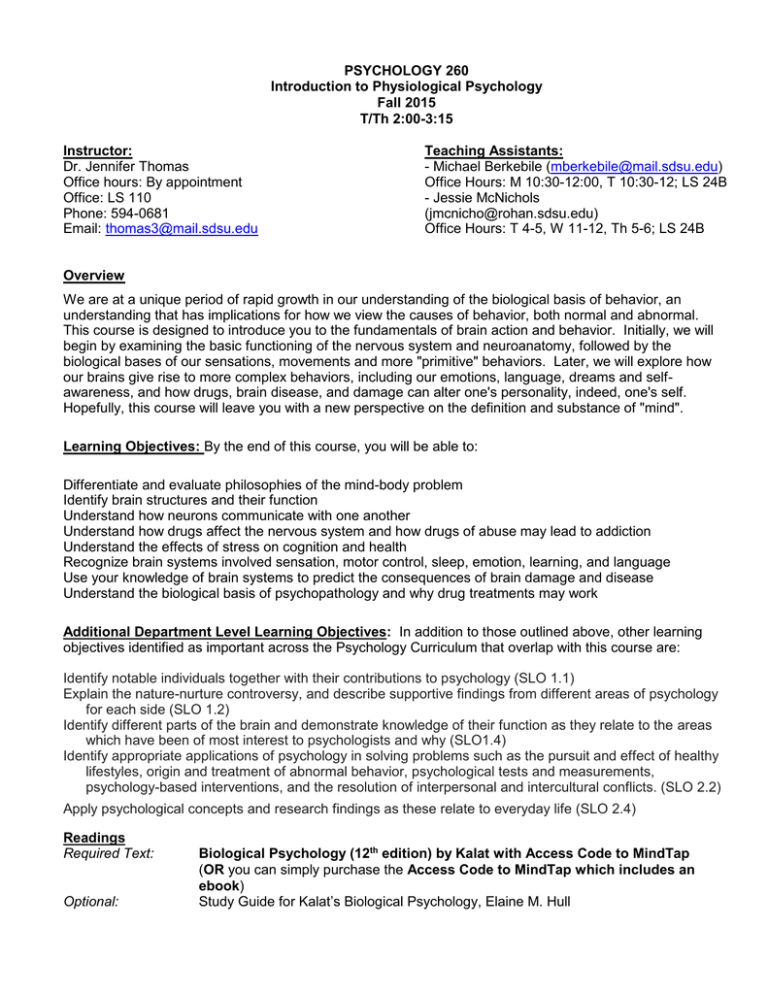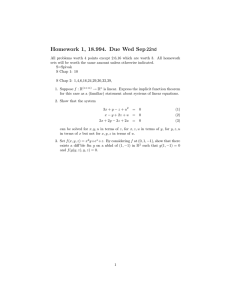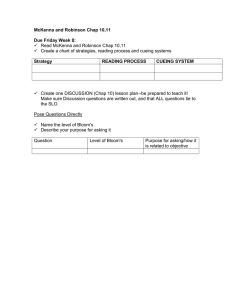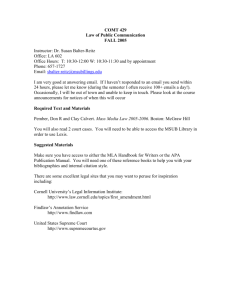Document 18021541
advertisement

PSYCHOLOGY 260 Introduction to Physiological Psychology Fall 2015 T/Th 2:00-3:15 Instructor: Dr. Jennifer Thomas Office hours: By appointment Office: LS 110 Phone: 594-0681 Email: thomas3@mail.sdsu.edu Teaching Assistants: - Michael Berkebile (mberkebile@mail.sdsu.edu) Office Hours: M 10:30-12:00, T 10:30-12; LS 24B - Jessie McNichols (jmcnicho@rohan.sdsu.edu) Office Hours: T 4-5, W 11-12, Th 5-6; LS 24B Overview We are at a unique period of rapid growth in our understanding of the biological basis of behavior, an understanding that has implications for how we view the causes of behavior, both normal and abnormal. This course is designed to introduce you to the fundamentals of brain action and behavior. Initially, we will begin by examining the basic functioning of the nervous system and neuroanatomy, followed by the biological bases of our sensations, movements and more "primitive" behaviors. Later, we will explore how our brains give rise to more complex behaviors, including our emotions, language, dreams and selfawareness, and how drugs, brain disease, and damage can alter one's personality, indeed, one's self. Hopefully, this course will leave you with a new perspective on the definition and substance of "mind". Learning Objectives: By the end of this course, you will be able to: Differentiate and evaluate philosophies of the mind-body problem Identify brain structures and their function Understand how neurons communicate with one another Understand how drugs affect the nervous system and how drugs of abuse may lead to addiction Understand the effects of stress on cognition and health Recognize brain systems involved sensation, motor control, sleep, emotion, learning, and language Use your knowledge of brain systems to predict the consequences of brain damage and disease Understand the biological basis of psychopathology and why drug treatments may work Additional Department Level Learning Objectives: In addition to those outlined above, other learning objectives identified as important across the Psychology Curriculum that overlap with this course are: Identify notable individuals together with their contributions to psychology (SLO 1.1) Explain the nature-nurture controversy, and describe supportive findings from different areas of psychology for each side (SLO 1.2) Identify different parts of the brain and demonstrate knowledge of their function as they relate to the areas which have been of most interest to psychologists and why (SLO1.4) Identify appropriate applications of psychology in solving problems such as the pursuit and effect of healthy lifestyles, origin and treatment of abnormal behavior, psychological tests and measurements, psychology-based interventions, and the resolution of interpersonal and intercultural conflicts. (SLO 2.2) Apply psychological concepts and research findings as these relate to everyday life (SLO 2.4) Readings Required Text: Optional: Biological Psychology (12th edition) by Kalat with Access Code to MindTap (OR you can simply purchase the Access Code to MindTap which includes an ebook) Study Guide for Kalat’s Biological Psychology, Elaine M. Hull The Kalat text provides an overview of important concepts within the study of biological psychology. However, the lectures will expand on these concepts and often cover material not discussed in your text, so it is imperative that you attend class and that you prepare before class by reading the assigned chapters. This will facilitate your understanding of the material and will also stimulate class discussion. I will also provide handouts, assignments, and weblinks periodically throughout the semester. Resources Website: MindTap: http://blackboard.sdsu.edu This class has a website on Blackboard that contains the syllabus, announcements, weblinks, handouts and additional study materials. MindTap is a website companion to the textbook which contains an ebook, additional information, animations and test quizzes. Homework assignments will be made available through MindTap. Also, there may be a few lectures that will be presented online via Wimba. You will be notified when these lectures will occur and will be given directions to observe those lectures. Finally, I reserve the right to make minor changes in the syllabus. Information: Course Evaluation Grade Scale: Grade Percentage: Exams & Quizzes: Class Policies Please check the website once a week for announcements. Also, please feel free to set up meeting times with me or the T.A.s if you are having difficulty with concepts. 90-100% = A 80-90% = B 70-80% = C 60-70% = D <60% = F 75% - 3 Exams 20% - Quizzes 5% - Assignments Your course grade will be based on 3 exams (2 midterms and a final), 5 quizzes, and homework assignments. Five quizzes will be administered periodically throughout the semester. You will be allowed to drop your lowest quiz score; the average of the other four quizzes will constitute your total quiz grade. Each exam is worth 25% of your grade and your quiz composite will be worth 20% of your grade. Exams and quizzes will include a combination of multiple choice and short answer questions. No make-up exams will be given except in the unusual case of a doctor-treated illness or serious family emergency. There will be no make-up quizzes. Quizzes will held at the beginning of class, so if you are late, you will have less time to complete the quiz. You will need to purchase and bring F289 Scantrons to class on test and quiz days. Assignments will be made available through MindTap, the website that accompanies the Kalat textbook. Even though this is a large class, to be fair to your classmates, common courtesies are required. Once you leave the classroom, you should not return, so bathroom breaks should be taken before or after class. If you need to leave class early for a valid reason, you should let me know at the beginning of class and sit next to the exit. Cell phones are not permitted and should remain off and in your bag during the duration of the class (this also means NO TEXTING). Failure to abide by this rule may lead to your removal from the class, as well as vicious personal mockery. Finally, cheating and plagiarism will not be tolerated. If you are found cheating you will receive no credit for that exam/quiz and may receive an “F” for the entire class and/or be expelled from the university. Safety To be prepared for emergencies, each student is responsible for becoming familiar with the evacuation plan specific to each classroom. The evacuation plan is posted within each classroom and should be examined on the first day of class. Students with Disabilities If you are a student with a disability and believe you will need accommodations for this class, it is your responsibility to contact Student Disability Services at (619) 594-6473. To avoid any delay in the receipt of your accommodations, you should contact Student Disability Services as soon as possible. Please note that accommodations are not retroactive, and that accommodations based upon disability cannot be provided until you have presented your instructor with an accommodation letter from Student Disability Services. CLASS SCHEDULE Week 1 DATE TOPIC READINGS Aug. 25/27 Intro to course Introduction Mind/Body Problem Historical Issues Chap. 1 (Module 1.1) Cells of the Nervous System Set up for Resting Potential Week 2 Sept. 1/3 Neuronal Conduction: Resting Potential /Action Potential Synaptic Communication QUIZ (Thurs. Sept. 3) Chap. 1 (Module 1.2) Chap. 2 Week 3 Sept. 8/10 MPTP Patients: Frozen Addicts Neurotransmitters Chap. 2 Week 4 Sept. 15/17 QUIZ (Tues., Sept. 15) Drug Actions and Drugs of Abuse Chap. 14 (Module 14.1) Week 5 Sept. 22/24 Drug Addiction Neuroanatomy Chap. 3 Week 6 Sept. 29 Exam #1 Oct. 1 Vision Chap. 5 Week 7 Oct. 6/8 Vision (cont) Chap. 5 Week 8 Oct. 13/15 Somatosensation Taste/ Olfaction Chap. 6 & p. 140-142 Week 9 Oct. 20/22 Movement Movement Disorders QUIZ (Tues., Oct 20) Chap. 7 Week 10 Oct. 27/29 Sleeping and Dreaming Sleep Disorders QUIZ (Thur. Oct. 29) Chap. 8 Week 11 Nov. 3 Nov. 5 Sex Exam #2 Chap. 10 Week 12 Nov. 10/12 Emotional Behavior Stress Chap 11 Week 13 Nov. 17/19 Neurobiology of Learning & Memory QUIZ (Thurs., Nov 19) Chap 12 Week 14 Nov. 24 Neurobiology of Learning & Memory (cont) Chap 12 & p. 125-130 NO CLASS NOV. 26 THANKSGIVING Week 15 Dec. 1/3 Lateralization & Language Chap 13 Week 16 Dec. 8/10 Neurobiology of Psychopathology Chap 14 (Modules 14.2 & 14.3) FINAL EXAM.TUESDAY, DEC. 15 1:00 PM


